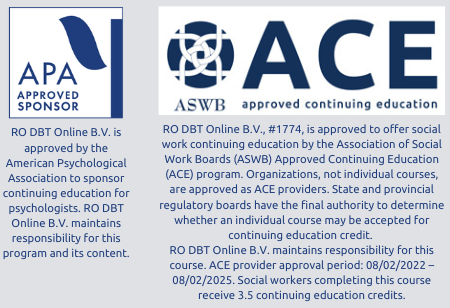Description and Learning Objectives
The Social Consequences of Indirect Social Signals: In this webinar Dr Lynch teaches more about the social consequences of indirect social signaling, how this can impact relationships, and what strategies you as a therapist can use to encourage your clients to communicate their experiences and needs more directly. Webinar Duration: 54 minutes
The Enigma Predicament: In this webinar Dr Lynch addresses the enigma predicament: the observation that overcontrolled clients secretly enjoy being difficult to comprehend and are difficult to impress. Dr Lynch teaches you how to recognize it, how it can impact the client’s relationships including the therapeutic relationship, and how to target this in treatment, with a special focus on responding to compliments. Webinar Duration: 1 hour 16 minutes
Using Behavioral Exposure to Enhance Social Connectedness: In this webinar Dr Lynch starts by explaining the basics of classical conditioning. Using a range of clinical examples, video and audio materials, Dr Lynch then goes on to explain how you as a RO DBT therapist can use brief behavioral exposures to feared social cues to help clients lay down new learning and respond in a pro-social manner Webinar Duration: 1 hour 27 minutes
Course length: 3 hours 37 minutes
CE credits: 3.5
Created/launched: December 14, 2020.
Learning Objectives. At the end of this course, you will be able to:
- Recognize the “I am fine” phenomenon and other indirect forms of communication that overcontrolled clients frequently use and ask for clarification when these occur
- Apply RO DBT strategies such as ‘ask don’t tell’, therapeutic teasing and heat-on heat-off when challenging overcontrolled clients
- Recognize the presentation of the Enigma Predicament in overcontrolled clients and target this in treatment
- Demonstrate to your overcontrolled clients how to effectively respond to praise or compliments
- Use brief informal behavioral exposure techniques to help your clients habituate to previously feared (social) cues
- Use repeated mini-practices to help your client respond in a pro-social manner to social cues in the real world
- Demonstrate ‘safety-on-the-go’ social signaling techniques
Entry Requirements & Additional Information
Target audience: clinicians with a professional qualification in a mental health or related field (e.g. psychology, psychiatry, social work, mental health nursing) who have already attended an RO DBT intensive training and who would like to refresh their knowledge.
Content Level: Intermediate - it is expected you are familiar with RO DBT.
Entry Requirements: You must have successfully completed Level 1 of the Radically Open Dialectical Behavior Therapy Blended Learning program or attended an RO DBT Intensive Training in the past.
Method of Delivery: this course consists of a non-interactive pre-recorded video. You will need to have a sufficiently strong internet connection to be able to stream the video.
Accessibility: All videos have the option to turn on English Closed Captions. If you have any questions, need help or want to discuss accessibility issues, please contact roelie@radicallyopen.net
Knowledge Quizzes: After each part you will be invited to complete a knowledge quiz via your online account. You will need to answer 80% of questions correctly in order to pass and move on to the next part.
Recommended Reading Materials:
- Radically Open Dialectical Behavior Therapy: Theory and Practice for Treating Disorders of Overcontrol (T. Lynch, 2018; published by New Harbinger)
- The Skills Training Manual for Radically Open Dialectical Behavior Therapy: A Clinician's Guide for Treating Disorders of Overcontrol (T. Lynch, 2018; published by New Harbinger)
These books will be used throughout the training as reference works. You will not receive excerpts from the Textbook or Skills Manual as part of the Level 2 and 3 courses. It is assumed that clinicians wishing to learn RO DBT will have purchased these books already. If you have not, you can purchase them through various book sellers, including Amazon and New Harbinger, the publisher.
Conflicts of interest: We don’t receive any direct commercial support for our training companies RO DBT Online B.V. or Radically Open Ltd. However, Dr. Thomas Lynch, the RO DBT treatment developer and chief RO DBT trainer, receives royalty fees for the RO DBT Textbook and Skills Manual from New Harbinger publishers. He is married to Mrs Erica Smith-Lynch, co-owner and director or RO DBT Online B.V. and Radically Open Ltd.
CE credits
 Certificate/Letter of Completion: You will be able to download a certificate of completion for 3.5 CE credits provided you have passed the knowledge quiz and have completed the CE evaluation form. If you want your professional license number to be added to your certificate, please add this to your profile via your account management page.
Certificate/Letter of Completion: You will be able to download a certificate of completion for 3.5 CE credits provided you have passed the knowledge quiz and have completed the CE evaluation form. If you want your professional license number to be added to your certificate, please add this to your profile via your account management page.
Accreditation: We are accredited by the American Psychological Association and by the Approved Continuing Accreditation / Association of Social Work Boards. ACE and APA credit is not awarded for prerequisite reading, homework, assignments, supervision, and consultation.
Instructor Bio: Dr Thomas Lynch
 Thomas R. Lynch, PhD, is Professor Emeritus in the School of Psychology at University of Southampton. He was the Director of the Duke Cognitive Behavioral Research and Treatment Program at Duke University (USA) from 1998-2007.
Thomas R. Lynch, PhD, is Professor Emeritus in the School of Psychology at University of Southampton. He was the Director of the Duke Cognitive Behavioral Research and Treatment Program at Duke University (USA) from 1998-2007.
Dr Lynch is the treatment developer of Radically Open-Dialectical Behaviour Therapy (RO-DBT)—a new transdiagnostic treatment approach informed by 20+ years of clinical research. He is the author of the RO-DBT treatment manual titled “Radically Open- Dialectical Behaviour Therapy for Disorders of Overcontrol” as a well as the RO DBT Skills Training Manual (2018; Context Press).
Dr Lynch has been the recipient of multiple large research grants from a range of sources, including the National Institutes of Health, National Alliance for Research on Schizophrenia and Depression, American Foundation of Suicide Prevention, the Hartford Foundation, the Wellcome Trust, and the National Institute for Health Research. He was also the Chief Investigator of a multi- centre randomized controlled trial examining the efficacy and mechanisms of RO-DBT funded by the NIHR- Efficacy and Mechanism Evaluation programme (http://www.reframed.org.uk/; Lynch).
He is a recipient of the John M. Rhoades Psychotherapy Research Endowment and a Beck Institute Scholar. He is recognized internationally as a world-leading expert in difficult-to-treat disorders; such as, personality disorders, chronic depression, and anorexia nervosa and is in frequent demand as a speaker internationally—e.g., Europe, USA, and Canada.
Refund, Cancellation and Grievances
Please see our Terms and Conditions
If you have any questions, need help or want to discuss accessibility issues, please contact roelie@radicallyopen.net

 Certificate/Letter of Completion: You will be able to download a certificate of completion for 3.5 CE credits provided you have passed the knowledge quiz and have completed the CE evaluation form. If you want your professional license number to be added to your certificate, please add this to your profile via your account management page.
Certificate/Letter of Completion: You will be able to download a certificate of completion for 3.5 CE credits provided you have passed the knowledge quiz and have completed the CE evaluation form. If you want your professional license number to be added to your certificate, please add this to your profile via your account management page. Thomas R. Lynch, PhD, is Professor Emeritus in the School of Psychology at University of Southampton. He was the Director of the Duke Cognitive Behavioral Research and Treatment Program at Duke University (USA) from 1998-2007.
Thomas R. Lynch, PhD, is Professor Emeritus in the School of Psychology at University of Southampton. He was the Director of the Duke Cognitive Behavioral Research and Treatment Program at Duke University (USA) from 1998-2007.